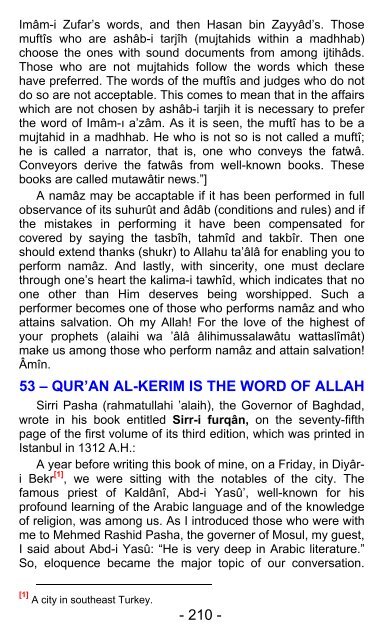1 - Endless Bliss - Hüseyin Hilmi Işık
1 - Endless Bliss - Hüseyin Hilmi Işık
1 - Endless Bliss - Hüseyin Hilmi Işık
Create successful ePaper yourself
Turn your PDF publications into a flip-book with our unique Google optimized e-Paper software.
Imâm-i Zufar’s words, and then Hasan bin Zayyâd’s. Those<br />
muftîs who are ashâb-i tarjîh (mujtahids within a madhhab)<br />
choose the ones with sound documents from among ijtihâds.<br />
Those who are not mujtahids follow the words which these<br />
have preferred. The words of the muftîs and judges who do not<br />
do so are not acceptable. This comes to mean that in the affairs<br />
which are not chosen by ashâb-i tarjih it is necessary to prefer<br />
the word of Imâm-ı a’zâm. As it is seen, the muftî has to be a<br />
mujtahid in a madhhab. He who is not so is not called a muftî;<br />
he is called a narrator, that is, one who conveys the fatwâ.<br />
Conveyors derive the fatwâs from well-known books. These<br />
books are called mutawâtir news.”]<br />
A namâz may be accaptable if it has been performed in full<br />
observance of its suhurût and âdâb (conditions and rules) and if<br />
the mistakes in performing it have been compensated for<br />
covered by saying the tasbîh, tahmîd and takbîr. Then one<br />
should extend thanks (shukr) to Allahu ta’âlâ for enabling you to<br />
perform namâz. And lastly, with sincerity, one must declare<br />
through one’s heart the kalima-i tawhîd, which indicates that no<br />
one other than Him deserves being worshipped. Such a<br />
performer becomes one of those who performs namâz and who<br />
attains salvation. Oh my Allah! For the love of the highest of<br />
your prophets (alaihi wa ’âlâ âlihimussalawâtu wattaslîmât)<br />
make us among those who perform namâz and attain salvation!<br />
Âmîn.<br />
53 – QUR’AN AL-KERIM IS THE WORD OF ALLAH<br />
Sirri Pasha (rahmatullahi ’alaih), the Governor of Baghdad,<br />
wrote in his book entitled Sirr-i furqân, on the seventy-fifth<br />
page of the first volume of its third edition, which was printed in<br />
Istanbul in 1312 A.H.:<br />
A year before writing this book of mine, on a Friday, in Diyâri<br />
Bekr [1] , we were sitting with the notables of the city. The<br />
famous priest of Kaldânî, Abd-i Yasû’, well-known for his<br />
profound learning of the Arabic language and of the knowledge<br />
of religion, was among us. As I introduced those who were with<br />
me to Mehmed Rashid Pasha, the governer of Mosul, my guest,<br />
I said about Abd-i Yasû: “He is very deep in Arabic literature.”<br />
So, eloquence became the major topic of our conversation.<br />
[1] A city in southeast Turkey.<br />
- 210 -




